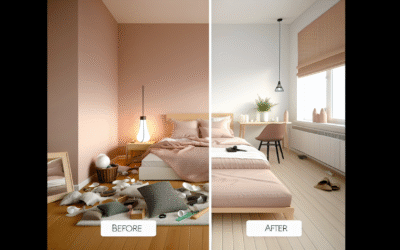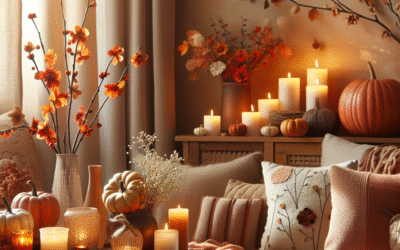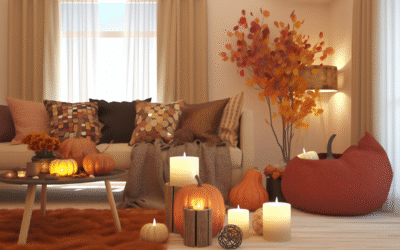
In our fast-paced world, finding effective ways to unwind can feel like a daunting task. This is where the power of aromatherapy comes in. By incorporating aromatherapy into your home, you can create a sanctuary of relaxation that not only enhances your mood but also promotes overall well-being. In this article, you’ll learn how to use essential oils, the right methods for application, and the science behind their soothing effects.
You’ll discover practical tips and tricks to seamlessly integrate aromatherapy into your daily routine, transforming your home into a peaceful retreat. Whether you’re looking to alleviate stress, boost energy, or promote sleep, we’ve got you covered. Let’s delve deeper into how you can use aromatherapy for relaxation.
Aromatherapy: The Science Behind the Scent
Aromatherapy is the practice of using natural oils extracted from flowers, bark, stems, leaves, roots, or other parts of a plant for enhancing psychological and physical well-being. Here, we’ll explore the science behind why and how aromas can influence our mood and health.
What Are Essential Oils?
Essential oils are highly concentrated plant extracts that retain the natural fragrance and properties of the plant. Common essential oils include lavender, eucalyptus, and tea tree oil, each having unique benefits.
How Aromas Influence Mood
When inhaled, the molecules of essential oils travel through our olfactory system and influence the areas of the brain associated with emotions. This can lead to physiological changes that promote relaxation.
Benefits of Aromatherapy
- Reduces stress and anxiety
- Enhances mood
- Promotes better sleep
- Boosts immunity
Choosing the Right Essential Oils for Relaxation
Not all essential oils have relaxation properties. Let’s focus on those that do and how you can use them effectively.
Top Relaxing Essential Oils
- Lavender: Known for its calming effects and often used for promoting sleep.
- Chamomile: Great for reducing anxiety and enhancing sleep quality.
- Ylang-Ylang: Helps lower blood pressure and alleviate stress.
- Bergamot: Uplifts mood and combats stress.
Blending Essential Oils for Maximum Effect
Creating blends of essential oils can amplify their effects. For instance, a combination of lavender and chamomile can produce a deeply relaxing atmosphere.
Methods for Incorporating Aromatherapy at Home
Using Diffusers
Essential oil diffusers are one of the most popular ways to enjoy aromatherapy at home. They disperse essential oils into the air, providing a constant supply of scent. To maximize the benefits, consider the following:
- Use water-based diffusers with a few drops of your chosen essential oil.
- Experiment with different oils at various times of the day.
- Keep the diffuser clean for optimal performance.
Creating Aromatherapy Candles
Making your own aromatherapy candles is another effective method. Melt soy wax, add essential oils, and pour into a container with a wick. This not only scents your home but also creates a cozy ambiance.
Aromatherapy in Baths
Add a few drops of essential oils to your bath for a relaxing soak. Oils like lavender and eucalyptus can enhance your bathing experience. Always mix oils with a carrier oil to prevent skin irritation.
Results: The Transformational Power of Aromatherapy
Incorporating aromatherapy into your home can lead to significant improvements in your relaxation and overall well-being. Many studies suggest that regular use of essential oils can:
- Improve sleep quality by promoting relaxation.
- Reduce symptoms of stress and anxiety.
- Enhance mood and emotional health.
FAQs
What essential oils are best for relaxation?
Lavender, chamomile, bergamot, and ylang-ylang are among the most effective essential oils for promoting relaxation and reducing stress.
How can I safely use essential oils at home?
Always dilute essential oils with a carrier oil, and conduct a patch test to check for allergic reactions before full use.
Can aromatherapy help with sleep issues?
Yes, studies have shown that certain essential oils like lavender can significantly improve sleep quality and reduce insomnia.
How long should I diffuse essential oils?
Generally, diffusing for 30 minutes to an hour is adequate. Be mindful of your sensitivity to scents and adjust accordingly.
Are there side effects to using essential oils?
While essential oils are generally safe, some individuals may experience allergic reactions or skin irritation. Always use them in moderation and consult a healthcare provider for concerns.
Categories
- Accent Walls & Ceilings (61)
- Art Curation & Gallery (62)
- Bedding Style Trends (68)
- Bedroom Makeover (81)
- Bohemian & Eclectic Styles (58)
- DIY & Budget-Friendly Decor (63)
- Eco-Friendly Design (62)
- Furniture Care (71)
- Home Decor & Design Ideas (163)
- Home Wellness Spaces (59)
- Integrated Outdoor Living (67)
- Japandi Style (61)
- Kids and Nursery Decor (59)
- Living Room Decor (79)
- Mix & Match Techniques (73)
- Modern & Contemporary Design (66)
- Rug Sizing & Placement (73)
- Scandinavian Design Inspiration (12)
- Seasonal Home Decor (80)
- Small Space Solutions (73)
- Wall Art & Painting Tips (77)
Recent Comments
Archives
Product Gallery
-
Large Area Green Rugs for Bedroom Nordic Living Room Decoration Shaped Carpet Irregular Plush Lounge Rug Home Thick Washable Mat
Rated 5.00 out of 5$36.00 – $225.00Price range: $36.00 through $225.00 -
Nordic Style Rugs for Bedroom Morandi Living Room Decoration Carpet Large Area Geometry Lounge Rug Home Cloakroom Non-slip Mat
Rated 5.00 out of 5$26.00 – $388.00Price range: $26.00 through $388.00 -
Irregular Shapes Living Room Decoration Carpet Modern Style Rugs for Bedroom Home Thicken Plush Rug Fluffy Soft Lounge Floor Mat
Rated 4.85 out of 5$37.00 – $226.00Price range: $37.00 through $226.00














